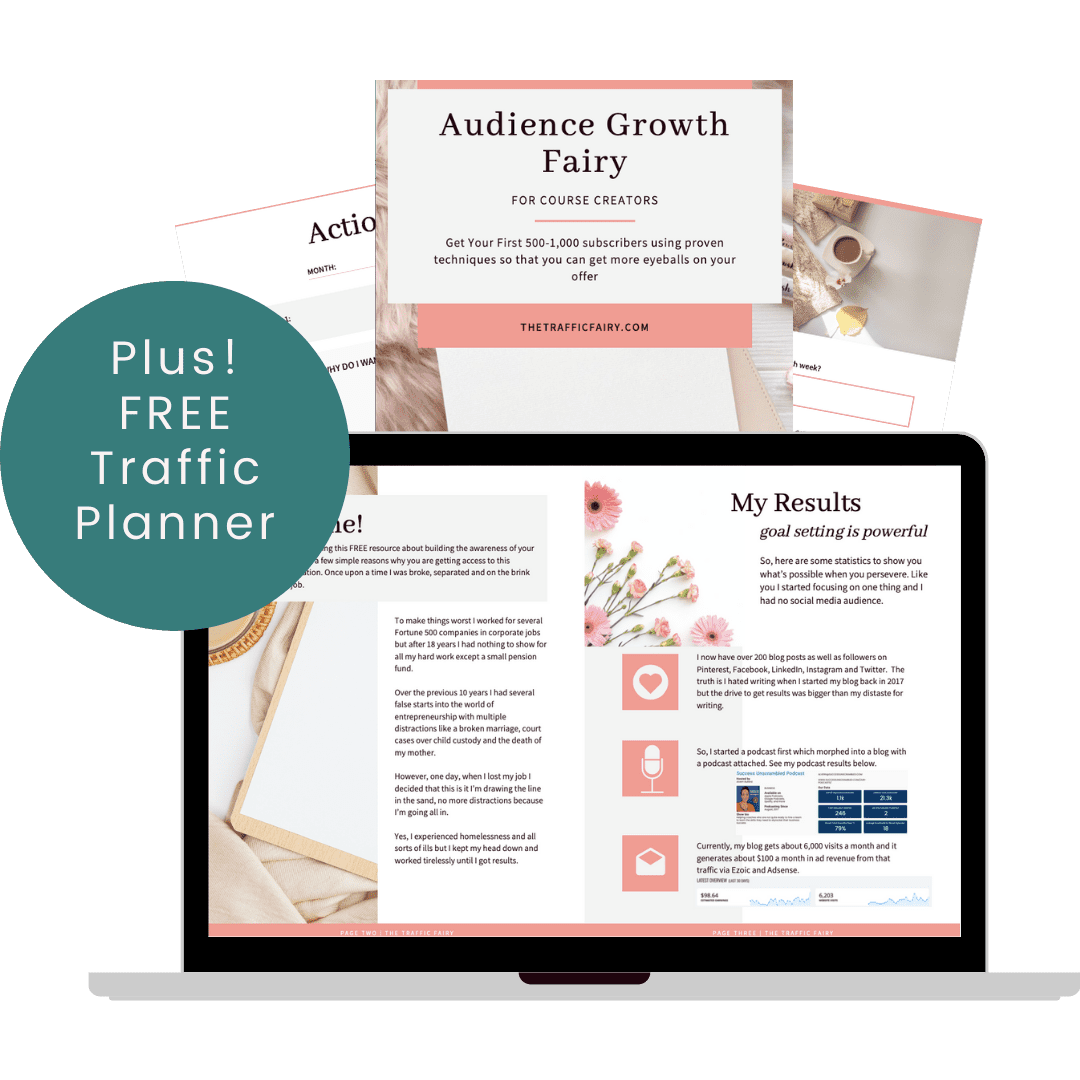Podcast: Play in new window | Download (Duration: 25:15 — 35.5MB) | Embed
Subscribe: Spotify | Amazon Music | Email | TuneIn | Deezer | RSS | More
Maxine wanted to know how to create a mini-course because a 6-figure course creator let her in on a little secret.
Just like Maxine, this 6-figure business owner got a successful start using a mini-course.
After hearing this Maxine was determined to grow her business using similar strategies.
However, there was one problem.
Maxine never created a mini-course before so she needed a guide or mentor to assist.
Let me know if you’re having an experience similar to Maxine’s.
- You’ve heard that less is more.
- How true is this concept in online course creation?
- Is there value in creating a one-hour or two-hour mini-course?
- Mini-courses can be powerful online tools for creators when created correctly.
If you’re just starting out, a mini-course provides a great platform for you to grow into full online courses. If you already have a course running it can be a great complement and drive sales to your full course.
But to create a valuable best-selling mini-course, you should select a topic, know how to create an online mini-course, and consider what modules you should include.
In this post, you’ll learn how to create a mini-course, how many modules a mini-course has, and the benefits of developing a short course.

What’s a Mini-Course?
A mini-course is a short online course or a condensed version of a full-length course. It can also be online video courses created for a targeted audience.
As a short course, it can contain a number of short videos and be used as a minimum viable product of a larger course.
A mini-course can be mini online video classes or a set of live trainings without printables or download options.
A mini-course is a powerful tool that creators use to build their online businesses. It takes less time and is one of the best ways to launch an online course business.
The focus of mini-courses is assisting people to gain experience and learn a new concept or skill. A mini-course acts as a tool creators use to attract market leads or acquire market validation.
Compared to full courses, mini-courses are action-oriented, more focused, and quicker and easier to complete. In most cases, creators use a free mini-course as a guide and platform for creating more expensive and longer courses.
Advantages of Developing a Mini-Course
Bigger isn’t always better, and creating a mini-course is simpler and takes less time to produce.
A mini-course is an appropriate way to start making money before launching your full-length course.
It can be placed at the front end of a sales funnel and sold using monthly subscriptions.
So why should you create a mini-course? Is it worth the time and the resources used when creating it? What are the potential advantages of developing a mini-course for your audience? Below you’ll find the primary benefits of creating a mini-course.
Less Time To Produce
If you don’t have the time to create a full-length course, but you still want to share your ideas online, why don’t you create a mini-course that requires less time to produce?
Producing a mini-course is faster than a full-length course. You can create a mini-course in two weeks and use limited resources and money. A large course has much more pressure and requires more investment of time and money.
Verify Your Market
Mini-courses also help you gauge demand for the selected topic before investing resources and time to create a larger course. You have the opportunity to create online courses to test your market.
When starting your online course business, starting small is always appropriate. You can even ask your audience what they really want through social media platforms and social networks. You can use the feedback to verify and validate your target audience and market.
Start small if it is your first online course to create and you feel insecure and uncertain. Select a mini-course topic and create a short online course for your target audience. It’s a good idea to test your idea and skills based on your course idea before developing a larger project.
Simpler
A mini-course covers a narrow subject, which makes it simpler to create than a full course as it does not include extra resources.
The course format of a mini-course addresses a specific topic of your choice. It is a simplified version of a full-length course.
The simplicity of mini-courses makes them easier to digest. Just like mini burgers, mini-courses can be digested easily and are better for business. Instead of focusing on a broad topic, you concentrate on a particular problem.
People don’t have all day to sit down and watch more than 200 hours of video or read a 6,000-word blog post on a given topic. The simpler the course, the better.
We’re all busy with work, kids, and running businesses. Creating shorter courses allows you to access students who might not have the time or need for the full breadth of your knowledge of your field.
Get More New Leads
A free mini-course is a great approach to capturing leads in your targeted audience. People are more willing to commit when the investment is smaller. Once you have their attention you can show them the value of your other, or future, offerings.
Where provided for free, mini-courses are lead magnets and can attract learners to pay for the full course. A mini-course is used to create and build an online audience. A mini-course can create expert recognition and generate reviews.
When you have a lead magnet, you’ll get students’ contact information and open a communication channel. You can use the contacts for email marketing for your other courses or services.
Many online course creators use mini-courses to attract leads and traffic into their marketing funnel. Students may be interested in a $500 course, but hesitant to commit. Such a large investment requires consideration. Giving potential students mini-course options allows them to test the water. With a $15 or free mini-course you can create brand extensions by appealing to new customers.
How can you promote your mini-course to get new leads? Here are the primary strategies you can use to promote your short course to generate leads.

Email Marketing
Email marketing is one of the most powerful tools you can use to promote your products, such as a mini-course. Popular email marketing campaigns include email newsletters and promotional emails.
You can check out our article, where we unscramble the leading steps to a successful email marketing strategy for course creators. You can use free email marketing services such as SendInBlue, Email Octopus, Benchmark, or MailChimp.
The advanced free options for marketing services include Zoho Campaigns (2,000 subscribers and also sends 12,000 emails monthly). You can also use Hubspot Marketing for the free email marketing tool and benefit from 1,000,000 contacts.
Social Media
You can share your content on social media platforms to attract more readers, convert your followers into clients, and grow your email list. You can get customised social media campaigns and improve conversion rates when marketing your own online course.
Social media platforms, including Twitter, Facebook, Quora, and Reddit, can be effective tools for promoting your mini-course. You can go beyond sharing it with your followers and find communities to share it with as well. Facebook groups relevant to your topic can be a great place to share!
You can also have sponsored Facebook Ads for your mini-course and quickly attract clients and generate leads. The best decision you can make is to use social media for advertising your short course.
Blogging
Although blogging can be time-consuming, it is a rewarding strategy that will create quality leads for your mini-course. You can create your own blog or even engage in guest posting on blogs your target students might already be following.
Content marketing provides a strategy to create credibility online and educate your clientele. You must make room for blogging as a marketing strategy for spreading knowledge and online presence.
Paid Ads
The most effective and quick way to improve your online presence is through paid ads. The only shortcoming you’ll experience when using paid ads is the financial investment. Facebook Ads and Google Ads are two top choices to consider to drive traffic to your course and generate leads.
Influencer Outreach
Offer YouTubers, Podcasters, Bloggers, Influencers, and Instagrammers free access to your mini-course, especially if they run accounts closely related to your course.
If a particular influencer has great reach with your target students you can also consider approaching them for a sponsored post.
Great Way to Start Making Money
You can start earning money before launching your full-length course. Just create mini-courses, sell them, and generate money today. Mini-courses are not capital intensive, and you can create them in a short time and start making a profit.
Creating a short course helps cut startup time and quickly produces profit. If you are already blogging, have a YouTube channel or podcast, or even extensive social media content related to your topic, you can repurpose this content to get started even faster.
Step-by-Step Guide to Creating Your Mini-Course
1. Choose Your Mini-Course Topic
Choose a mini-course topic that demonstrates your expertise and can bring potential clients to your brand. Choosing the right mini-course topic is the key to your success.
Your topic should be something that you are knowledgeable about and that can be imparted to others in a short course format.
Whether you’re an expert or new, you need to choose a topic you can comfortably write (or talk) about and that will significantly assist your target audience to achieve their goals.
If you already have existing content, narrow it down and create a mini-course. A creator with an email list already understands the market and the content they’re interested in and passionate about. Ensure the mini-course topic aligns with your target audience.

2. Establish the Learning Objectives
Now that you have chosen your mini-course topic, what are your goals? What do you want to accomplish with your mini-course?
Creating learning objectives is the answer to these questions. Defining your learning objectives, goals, and mini-course objectives will help you organise your course content.
Achievable objectives will help you to promote your mini-course effectively. If you have clear objectives, your target audience will have a reason to join your mini-course.
3. Research
The next important step is to conduct online research for your topic ideas and plan the course outline. The research will help inspire you and ensure you aren’t missing anything related to your mini-course topic.
The research should include an extensive Google search, a social media dive, reading Amazon, and checking out the competition.
Don’t skip research; remember to search on Facebook, browse Instagram hashtags, and look for your topic on Twitter. Next, conduct keyword research using online tools such as Keyword Tool, SEMrush, Google Trends, and Buzzsumo.
Why does research matter? Given that you want to generate traffic and sales, you need an organic search for your course topic. A well-researched topic can help your minicourse rank in the search engine results pages (SERPs).
After you find your topic and search a keyword for your minicourse, create a title that will rank and generate excitement among your followers. You can also use powerful verbs and adjectives to appeal to your audience.
A pro tip: A well-sought-after keyword will increase the chances of your potential student searching and finding your mini-course and purchasing it.
4. Create a Buyer Persona for Your Short Course
What is a buyer persona, and why do you need to create one for your short course? Briefly, a buyer persona is also known as the audience or marketing persona and helps you create content targeting your audience.
A buyer persona is important and will keep you focused on addressing your potential student’s priorities rather than your own. A buyer persona describes the individuals who represent your target students.
If you don’t know your target students, you cannot market your mini-course effectively. Creating a buyer persona for your short course will enable you to choose marketing strategies that resonate with them.
A buyer persona’s information can include age, income, hobbies, spending habits, and personal and professional goals.
5. Sketch Your Mini-Course Outline
After you have gathered all the necessary information for your mini-course, the next step is to create your mini-course outline. The mini-course outline helps you plan out the flow of your course and ensure that the pieces build on each other.
Whether you’re creating your course from scratch or repurposing content, you can utilise a mini course outline template. An outline will help you connect the dots and put your ideas together for the mini-course.
Your course outline breaks the topic down into modules that align with your mini-course learning objectives. It will help you put all of your ideas into an actionable, logical order.
6. Create Your Course Content
Now that you have all the information, you can start to create your mini-course. So far, you’ve done your research, keyword search selected a topic and sketched your mini-course outline, you can now create your content.
Be sure to compile your content into an easy-to-use mini-course package attractive to customers.
You must ensure that your content is actionable, unique, focused, and reliable. You want to attract your audience and convince them to purchase your short course.
The goal is to provide value for money to your students. If they are happy with your mini-course you can convert them into students for longer courses and other offerings. You can deliver gold in your mini-course as an expert on your topic. Building a mini-course is simple, and you can use Kajabi and other platforms with pre-built blueprints.
What Should the Price of a Mini-Course Be?
After creating your mini-course, you should determine its price. You need to research and set the right price for your mini-course. Many creators give their mini-courses for free to create leads and get a taste of the full course. However, you can choose to sell it for a small fee.
An impulse price point is recommendable for your short video or written course. You can set the price of your course as low as $20, $50, or even $100. People are more likely to pay a small price for a mini-course, given the availability of free online short courses.
If you’re unsure about the price, you can consider charging $10-$50 for your mini-course.
How Long Does It Take To Make a Mini-course?
An attractive online mini-course requires planning and commitment. On average, a mini-course will take you one month to create. It might also take you one day to three months to fully create a mini-course.
The length of a mini-course depends on the content to be included, materials, format, and learning objectives. If you’re integrating video content into your mini-course, you might require an additional ten to fifty hours of recording and editing.
How Long Should a Mini-course Be?
So, how many modules is a mini-course and how long should a class be? There is no rule of thumb on the number of modules you should have in a mini-course. Shorter modules are easier to digest and more engaging so multiple modules are encouraged even in a mini-course.
An ideal mini-course will allow your students to learn within the shortest time possible. A mini-course should range between 30 to 90 minutes.
As we have discussed, your potential students are busy people. They are opting for your short course to quickly develop a targeted skill or to assess your offerings before committing to a longer course. Bear that in mind and keep things quick and concise.

How do you Generate Leads for your Mini-course?
Generating leads for your mini-course requires consistency and dedication. You can use some of the following ideas to attract attention and generate leads for your mini-course:
- Make use of referral marketing
- Embark on creating blog posts and guest blogging that follow best practices for search engine optimization (SEO)
- Create quick videos that act as minicourse teasers
- Be active on social media networks such as Instagram or Twitter
- Use pay-per-click (PPC) advertising for your mini-course
- Participate in webinars, networking events, and podcasts.
Conclusion
A short online course is worth launching if you’re optimistic about your online business. A mini-course is a great stepping stone to creating a full course. You can also opt to create a mini-course as a way to convert students to your other full-length course offerings.
Be sure to follow the steps I’ve outlined here on how to create a mini-course to get you started. You can find the main takeaways here:
- They are simpler and take less time to create than full-length courses.
- They can help you generate new leads and traffic.
- A mini-course provides a great way to start making money quickly.
- Depending on the content, you can sell your mini-course for $10, $50 or $100.
- The time duration should be around 30 to 90 minutes.
Do you have a mini-course or full program you need to launch and want to increase your profitability and conversion rate? Let me help you unscramble your success through launch management services.

